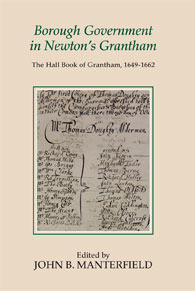
Regulation of crafts and trades, setting the poor to work, upkeep of streets, the provision of godly ministers and schoolmasters and even the maintenance of the church fabric (notably its famous spire) were all matters of concern for the borough government in mid-seventeenth-century Grantham. The Hall Book (1633-1704), the earliest surviving record of the proceedings of the Alderman’s Court, has much to tell us about the way the Corporation administered the affairs of the town.

Regulation of crafts and trades, setting the poor to work, upkeep of streets, the provision of godly ministers and schoolmasters and even the maintenance of the church fabric (notably its famous spire) were all matters of concern for the borough government in mid-seventeenth-century Grantham. The Hall Book (1633-1704), the earliest surviving record of the proceedings of the Alderman’s Court, has much to tell us about the way the Corporation administered the affairs of the town.
This volume takes the story up to the Restoration settlement of 1660-2; it spans the time during which the young Isaac Newton attended the town’s Grammar School, lodging with William Clarke, a wealthy apothecary and prominent member of the Comburgesses, as the senior twelve of the Borough Court were known, and the restoration to office of former Royalists purged in 1647. It contains some 1,500 entries, along with an appendix, which will be invaluable to local and family historians, providing details of all those who served as members of the Corporation as Comburgesses and Second Twelve men during this period. The introduction examines the town in the seventeenth century, its ruling corporate elite and civic culture.
Jacket Front: ‘Grantham Hall Book: detail showing the names of those attending the first Court of Alderman Thomas Doughty on 30 October 1657 by kind permission of Lincolnshire Archives and South Kesteven District Council.’
This volume takes the story up to the Restoration settlement of 1660-2; it spans the time during which the young Isaac Newton attended the town’s Grammar School, lodging with William Clarke, a wealthy apothecary and prominent member of the Comburgesses, as the senior twelve of the Borough Court were known, and the restoration to office of former Royalists purged in 1647. It contains some 1,500 entries, along with an appendix, which will be invaluable to local and family historians, providing details of all those who served as members of the Corporation as Comburgesses and Second Twelve men during this period. The introduction examines the town in the seventeenth century, its ruling corporate elite and civic culture.
Jacket Front: ‘Grantham Hall Book: detail showing the names of those attending the first Court of Alderman Thomas Doughty on 30 October 1657 by kind permission of Lincolnshire Archives and South Kesteven District Council.’